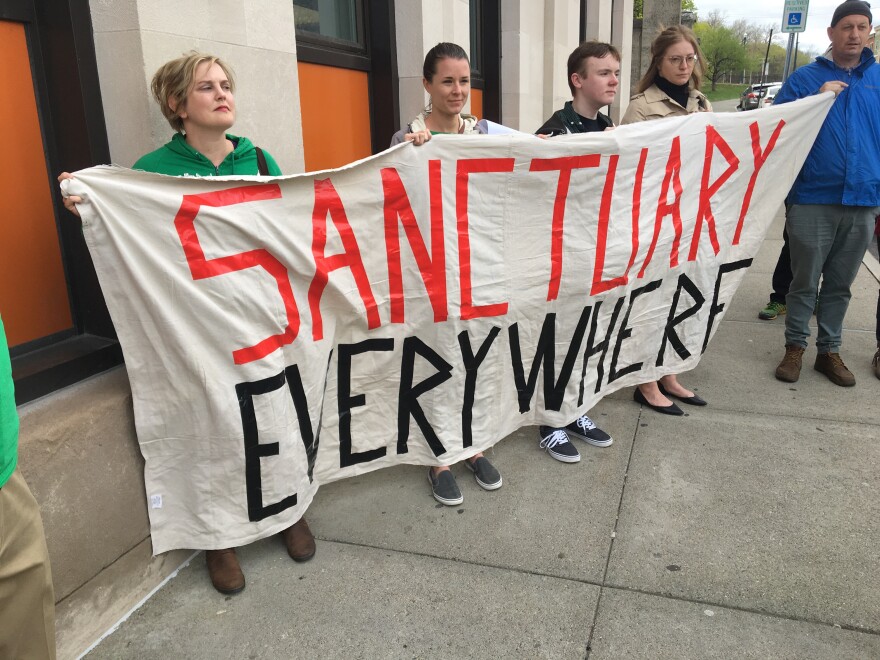Migrants from New York City have begun arriving in Albany County, but local officials have differing approaches to the asylum seekers.
As plans to move migrants upstate became known, many New York counties declared states of emergency geared toward slowing or stopping the flow of asylum seekers. A week ago, Albany County Executive Dan McCoy issued such an order, which says in part that no municipality may make contracts involving the transportation of migrants to house them within the county without permission from him. The Democrat pointed out that no hotel, motel or shelter could house migrants without a license issued by the county.
"The company that represents Mayor Adams, down in New York City was reaching out to our hotels and making offers to rent them for three years, one for the tune of like over $3 million," McCoy said.
Nevertheless, a busload of undocumented migrants from New York City arrived at the SureStay Plus Best Western Hotel on Sunday morning in the Albany County Town of Colonie. Republican Town Supervisor Peter Crummey said Mayor Eric Adams did not notify the town and blamed the Democrat for ignoring McCoy's emergency order that called for a “collaborative and coordinated deliberate plan” between state and local officials and non-profit agencies ahead of any such arrival.
"They were planning in Colonie to move 400 migrants into the Best Western Hotel on Wolf Road," said Crummey.
Over the weekend, Crummey sent police officers to motels and hotels armed with copies of the town’s hotel ordinance, which caps room occupancy at 28 days. He also won a court injunction to keep more migrants from arriving in town.
"They got in there before the court order but as you know in Colonie our local law doesn't allow occupancy beyond 28 days, whether they leave in the meantime and move somewhere else remains to be seen," Crummey said. "But they certainly, we have local laws in place adopted eight years ago to make sure that we don't have any long-term stays."
Albany Mayor Kathy Sheehan issued a statement Sunday afternoon, welcoming the city's first bus of approximately 40 asylum seekers, which the Democrat said had decided to contract with the Ramada Inn on Watervliet Avenue in the city. Crummey commended Sheehan and Albany "for stepping forward and and honoring their stated commitment that they are a sanctuary city."
"The city mayor of Albany first pushed away Mayor Adams' efforts to bring buses to Albany city. I'm told by a variety of sources that her position was, 'Oh, there's too much crime in Albany. We don't want the migrants here.' She was well aware, and part of the plan to move a bunch of migrants into Colonie at midnight, never called me of course to give me a heads up. Now, of course, David, you do have a situation where yesterday she has done a 180, which I congratulate her for, and now [she] says 'oh, we're a sanctuary city, we're happy to have the migrant busses.'"
Sheehan’s office has vociferously disputed Crummey’s account of the situation. The mayor spoke with WAMC Tuesday morning.
“Peter Crummey is just flat out wrong," said Sheehan. "The city of Albany has no control over this. We did not send migrants anywhere. We have been in contact with New York City when New York City informed us of the need to deal with the overcrowded shelters that they have down in New York City. It was my understanding that there was going to be asylum seekers coming to Albany, they went to Colonie. That was the decision that was made by New York City. I was not involved in the decision. I didn't advocate for that decision. I repeated that over and over again. And that's just the facts of the matter."
Crummey says legal proceedings to halt the flow of migrants are in motion.
"Our case before the Supreme Court is next set for June 9th," Crummey said. "We will be entertaining, the court wil be asked to entertain a preliminary injunction, pending the matter itself. It might take, as an attorney for 40 years and knowing that there are scores of cases now developing throughout the state, there will probably be a motion somewhere to consolidate all of these cases, many of the legal issues are the same."






